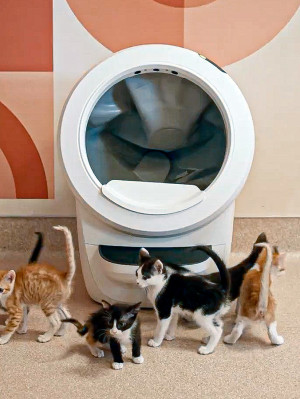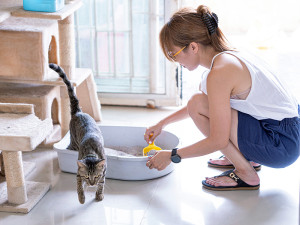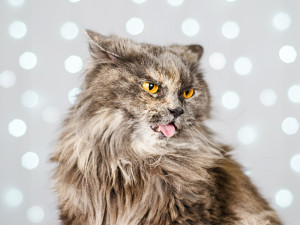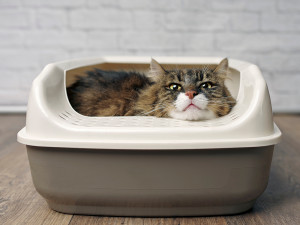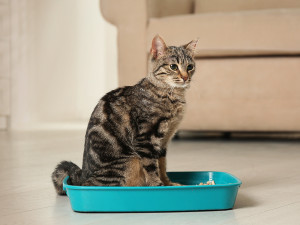Kitten Diarrhea: Causes, Symptoms, and Treatment
Gross? Yes. Important to discuss? Also, yes.
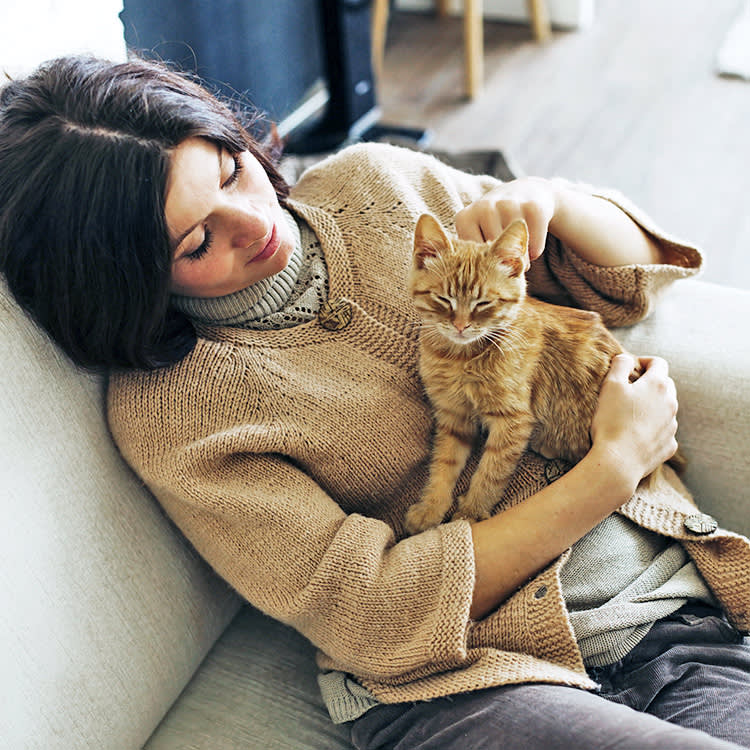
Share Article
In This Article:
Common Causes of Kitten Diarrhea Symptoms of Kitten Diarrhea How to Treat Diarrhea in Kittens When to See a Vet for Kitten Diarrhea
There’s nothing more heartwarming than becoming a parent to a new kitten. That is, until you wake up to the nearly inevitable diarrheal explosion (hopefully) in your kitten’s litter box.
Between their curiosity leading them to eat random things or catch an assortment of germs, it’s very common for kittens to get diarrhea. But the good news is, you don’t have to simply accept this. We’ll help you understand the frequent causes of diarrhea in kittens and give you some tips on how to treat it — and when to see a professional.
Common causes of kitten diarrhea
Dietary changes
While we all like a little variety in what we eat, your kitten’s digestive system actually does not. Sudden changes in the food that your kitten eats can throw their digestive tract into chaos, creating diarrhea and potentially other disruptions, like vomiting or gas.

Bacterial or viral infections
Everything is new to your kitten, from new sights and sounds to new germs. Their immune system is still in the developing phase, so a lot of those new germs won’t be met with the force of immunity that they will see later in life. This means that mingling with other animals and even their environment can set them up for bacterial or viral infections that may cause diarrhea.
One common virus that those of us with dogs may also worry about is parvo. The parvovirus takes on its own form in cats, known as feline panleukopenia virus, which can cause digestive issues such as diarrhea. Another potential diarrheal issue to be aware of is fading kitten syndrome, which may be related to infections, among other things.
Parasites
Internal parasites are very much a part of a cat’s world and very much a cause of diarrhea in kittens. Many parasites are capableopens in new tab of instigating diarrhea, usually because they create irritation, inflammation, and damage to the lining of the intestines.
One parasite that you may be familiar with in cats is Toxoplasma gondii. While it is a cause of toxoplasmosis, which may lead to diarrhea in your kitten, it can also infect their pet parents and is something you want to watch out for if you are pregnant or have a compromised immune system.
Stress
It may seem like your kitten lives in a perpetual cycle of eat-play-sleep. But in actuality, your kitten experiences their fair share of stress, which can contribute to diarrhea. Weaning, moving, sharing, even new sounds and smells can be stressful to a kitten, potentially leading to diarrhea as their body tries to adjust.
Toxins
As you’re well aware, cats are very curious, and kittens even more so. All of that curiosity can end up in diarrheal trouble if your kitten ingests something toxic. Things like household cleaners, plants, human medications, and some human food can cause diarrhea in kittens.
Cow’s milk
While giving a kitten a saucer of cow’s milk has a certain romantic flair to it, it’s actually not something good for your kitten. You see, all milk is not created equally, and kittens actually can’t really digest milk from cows. Instead of gleaning important nutrients from cow’s milk as you’d hoped, most kittens will instead end up with diarrhea.
Side effects from medication
Medication may be given to your kitten to help treat or prevent an illness or other malady. Unfortunately, the action of most medications doesn’t end there. Instead, medications, including vaccinations, can cause diarrhea in your kitten. While typically mild, it is something you’ll want to monitor and report to your veterinarian if it doesn’t go away within a few days, or if it becomes worse.
Eating foreign objects
Remember how we said kittens are curious? We’re bringing this up again because it can be a big issue for some young cats. Not only is ingesting toxins a cause for diarrhea, but eating foreign objects like string is too. It can also potentially cause an intestinal blockageopens in new tab if it’s the right size, something that may require surgery to remove.
Digestive disorders
The above causes of diarrhea in kittens are due to something that got into the kitten’s digestive tract. Occasionally, diarrhea in kittens may be due to something that’s already abnormal with their digestive system. Pancreatitis or inflammatory bowel disease are a few of the rare digestive disorders that may cause diarrhea in kittens.
Symptoms of kitten diarrhea
Diarrhea in kittens is such a common ordeal that it should be added to the topic list for every kitten wellness or vaccination exam — because some cat parents may not recognize kitten diarrhea right away.
Signs of diarrhea in kittens may include:
Loose or watery poop
Increased pooping frequency
Straining to poop or painful pooping
Blood in the poop
Overly smelly poop
Kitten diarrhea can also be accompanied by these signs, especially if severe or long-term:
Weight loss
Vomiting
Fever
Dehydration
Not eating
What is the normal color of kitten poop?
Now that you know what you don’t want to see in your kitten’s litter box, let’s go over what you do want to see. Normal kitten poop should vary in shade from light to medium or darker brown, depending on the food they eat. It should be formed yet soft, and your kitten shouldn’t have trouble passing it. It’s going to smell, but it shouldn’t be so bad that it keeps you out of the room.
As far as frequency goes, most kittens will poop one to five times per day. The number should decrease as a kitten gets older and their digestion starts to regulate.
How to treat diarrhea in kittens
The best way to treat kitten diarrhea is to get to the root of the cause and start fixing it from there. But if you can’t pin down a change in food or the eating of your tuna sandwich as a cause for your kitten’s diarrhea, you may want to try some home remedies.
Three home remedies for kitten diarrhea
Keep in mind that home remedies are only for mild cases of kitten diarrhea. If this is an issue that’s been going on for a while, if your kitten is showing other signs of illness, or if the diarrhea is very severe, see your vet first and foremost. If that is not the case, you can try the following fixes.
Start with a bland diet. You may read that withholding food is a good treatment for diarrhea, but a kitten’s tiny body and fast metabolism isn’t the right setup for fasting. Instead, give your kitten some easily digestible food, such as boiled chicken and rice, to allow their gut a bit of time to rest.
Feed small, frequent meals. Divide your kitten’s daily allotment of food into four to five or even six smaller meals that you feed them every couple of hours. This keeps the digestive system from overworking while it’s trying to heal.
Add a probiotic. Probiotics are the good bacteria in your kitten’s digestive tract. When in a healthy balance, they help digest food. When things get off kilter digestively, giving a healthy dose of these good bacteria can help restore the proper balance.
Prescription treatment for diarrhea in kittens
If it comes to it, your veterinarian has a variety of effective treatments for kitten diarrhea. With some diagnostic tests, such as a fecal test, your vet will be able to determine the best course of action.
For kitten diarrhea, vets may consider the following.
Dewormers: Most kittens arrive pre-programmed with intestinal parasites. It’s often just part of the deal, so your vet will likely be giving the best kitten dewormer to them at every visit for those first few months.
Diet: If boiled chicken and rice or another bland diet doesn’t do the trick, your vet may recommend sensitive-stomach cat food. These are just highly digestible diets that provide proper nutrition while supporting the digestive tract.
Antibiotics: Infections will likely get a course of antibiotics to help rid the body of the bad bacteria causing the problems.
Probiotics: Your vet will want to repopulate the digestive tract with those helpful bacteria we talked about earlier.
Supportive care: This is where your vet will address any other issues, such as dehydration, by giving your kitten fluids, antidiarrheal medications, anti-nausea medications, or anything else they need.
Surgery: Surgery may be necessary if your new kitten ate something that isn’t making its own way out.
When to see a vet for kitten diarrhea
Diarrhea in kittens may be a common issue, but it isn’t something you want to write off as normal. It can become very serious very quickly. Know that you should see a vet sooner rather than later if your kitten has any of the following symptoms:
Fever
Bloody poop
Not eating
Dehydration
Vomiting lasting longer than 24 hours
Diarrhea lasting longer than 24 hours, or 48 hours with home treatment
FAQs
Are kittens more prone to diarrhea than adult cats?
Adult cats are no stranger to diarrhea, but kittens seem to take the cake when it comes to susceptibility. That’s because a kitten’s immune system and digestive tract are in development mode. They aren’t fully formed and functional like an adult cat’s is. This means there is a lot of room for disruptions that can lead to diarrhea, such as infections and food sensitivities.
What causes yellow diarrhea in kittens?
Yellow diarrhea in kittens can indicate a bacterial infection, toxin ingestion, or issue with the liver. Your kitten should see a vet if they have yellow diarrhea for longer than 24 hours.
What if you see blood in a kitten’s diarrhea?
Blood indicates that there has been a break somewhere in the intestinal barrier, which can allow bacteria to get to places where they shouldn’t be. See your vet if you notice blood in your kitten’s poop.
What should you feed a kitten with diarrhea?
Bland diets, such as boiled chicken and rice, work well for kittens with diarrhea in the short term. They provide easily digestible nutrition that will help the gut heal. If your kitten needs a more long-term solution, sensitive-stomach cat food may be the best option.
Can wet food cause diarrhea in kittens?
Wet food can be a cause of diarrhea for kittens, especially if they are given it abruptly. Any sudden change in diet can explain why your cat has diarrheaopens in new tab.
References
Case, Jamie DVM. “Kitten Diarrhea.” PetMD. 24 Feb. 2023. https://www.petmd.com/cat/general-health/kitten-diarrheaopens in new tab.
Gagne, Jason DVM, “Kitten Diarrhea: Causes, Symptoms, and Treatments.” Purina. 18 Jun. 2024. https://www.purina.com/articles/cat/kitten/health/kitten-diarrheaopens in new tab.
Marks, Stanley L and Michael D Willard. “Diarrhea in Kittens.” National Library of Medicine. 15 May 2009. https://pmc.ncbi.nlm.nih.gov/articles/PMC7149963/opens in new tab.
Mears, Erick DVM. “Kitten Diarrhea (Should You Be Worried?).” Blue Pearl Pet Hospital. 24 Aug. 2019. https://bluepearlvet.com/medical-articles-for-pet-owners/kitten-diarrhea/opens in new tab.

Dr. Chyrle Bonk, DVM
Dr. Chyrle Bonk has been a mixed-animal veterinarian since 2010, with a special interest in rehabilitation. When she's not practicing or writing about veterinary medicine, you may find her exploring the outdoors with her family or tending to her cows, horses, chickens, or cats and dogs.
Related articles
Why Does My Cat Throw Up After Eating?
That doesn’t seem normal...
Why Does My Cat Have Diarrhea?
Let’s try to, erm, firm up the details.
Why Does My Cat Poop Outside of the Litter Box?
The worst kind of surprise.
![grey and white cat with tongue sticking out]()
Why Does My Cat Keep Throwing Up?
Here’s when you should worry.
![Funny tabby cat sitting in a litter box and looking curiously outside.]()
Best Cat Litter in 2025: Low-Tracking, Dust-Free, Eco-Friendly
Helping your cat find their preferred litter doesn’t have to be a crapshoot.
![Cat sitting in a teal litter box]()
How to Train a Cat to Use a Litter Box
If you do nothing else, teach your cat to poop in their litter box (not your shoe).


